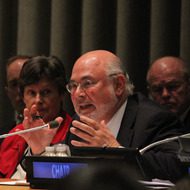opening remarks by Jonathan Granoff
at the event “Nuclear Weapons and the Moral Compass”
co-hosted by the Permanent Mission of the Philippines and the Global Security Institute
United Nations Trusteeship Council Chamber
April 30, 2014
Sometimes a specific incident opens a deep understanding of a general condition. The Malmstrom Air Force Base in Montana, USA, is home to around 150 Minuteman III Missiles. The payload of each of these missiles is normally the equivalent of over 20 Hiroshimas. The explosive capacity of these 150 devices is simply beyond our capacity to accurately imagine.
Recently over 90 nuclear missile launch officers there were punished in an exam-cheating scandal, and nearly the entire chain of command was dismissed. The press and the public expressed outrage at their transgressions. The testing was to establish their competency, readiness, willingness, and capacity to extinguish civilization and much of human life on the entire planet within an afternoon. This was ignored by the mass media. Such ignorance is nearly as outrageous as their incompetency. If this be the moral guidance of global leadership and public discourse there is little likelihood of reaching the coherence of a safe harbor.
Reflecting on this dangerous situation, the Global Security Institute is privileged to be able to co host this session with the Permanent Mission of the Philippines to the United Nations. It is a truly an honor to co chair here with Ambassador Cabactulan who so masterfully led the over 190 States parties to the NPT to a successful 2010 Review Conference where 64 policy steps were agreed upon to help move the world toward nuclear disarmament and strengthen constraints on proliferation.
Today, our gathering titled Nuclear Weapons and the Moral Compass hopefully begins bringing a strengthened advocacy to fulfill those commitments. Words must mean something. Promises must be kept. That is a basic legal and moral premise. Thus, promises under the NPT to obtain nuclear disarmament must be honored. But a deeper moral probe must conclude that nuclear weapons themselves are legally and morally unacceptable because of their horrific nondiscriminatory destruction of life.
Some say moral ideals are not practical. That might sometimes be the case. Can there be a practical policy paradigm that is not morally sound? That would surely lead to improved means to unimproved ends — an efficient set of measurable accomplishments leading to immoral ends. We need a compass, a moral compass to lead us from the downward spiral destroying the climate, the ongoing risk of nuclear annihilation, and the failure to cooperate to address these existential threats to a route that guides to a safer saner world.
A Moral Compass is informed by universal moral principles to help create policies to address existential practical challenges, first and foremost amongst them being the elimination of nuclear weapons before they eliminate us.
https://www.nytimes.com/2014/03/28/us/air-force-fires-9-officers-accused-in-cheating-scandal.html
https://www.nytimes.com/2014/01/31/us/politics/92-air-force-officers-suspended-for-cheating-on-their-missile-exam.html
Jonathan Granoff is the President of the Global Security Institute, a representative to United Nations of the World Summits of Nobel Peace Laureates, a former Adjunct Professor of International Law at Widener University School of Law, and Senior Advisor to the Committee on National Security American Bar Association International Law Section.







